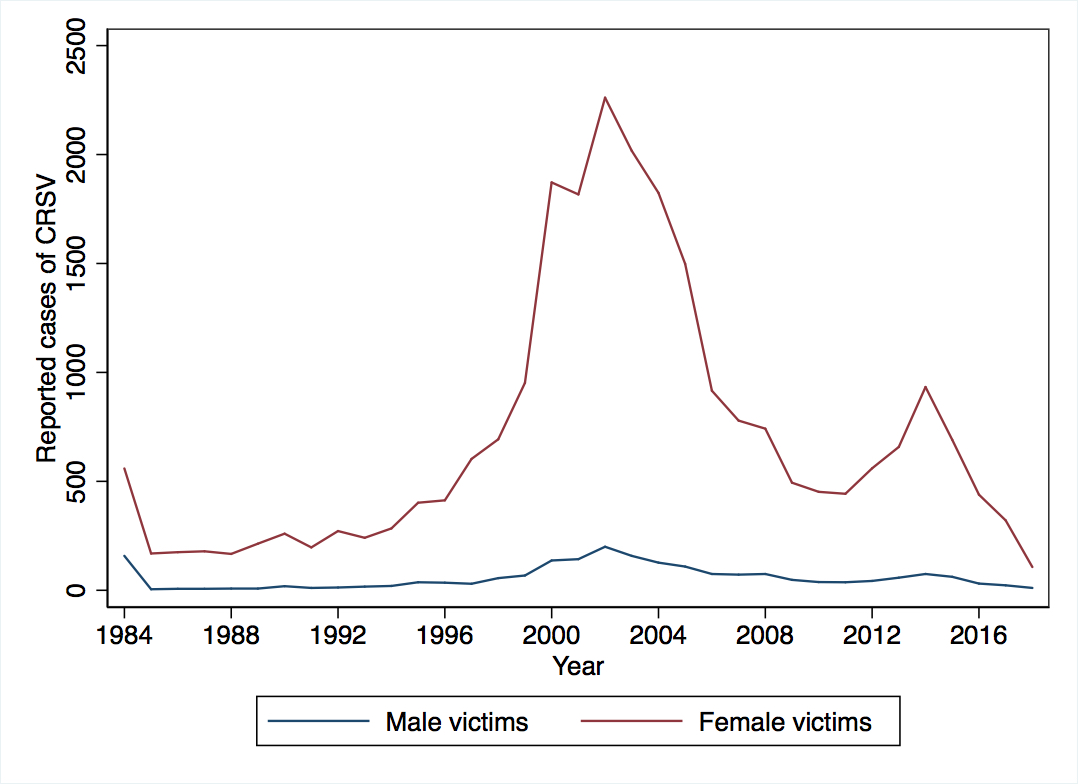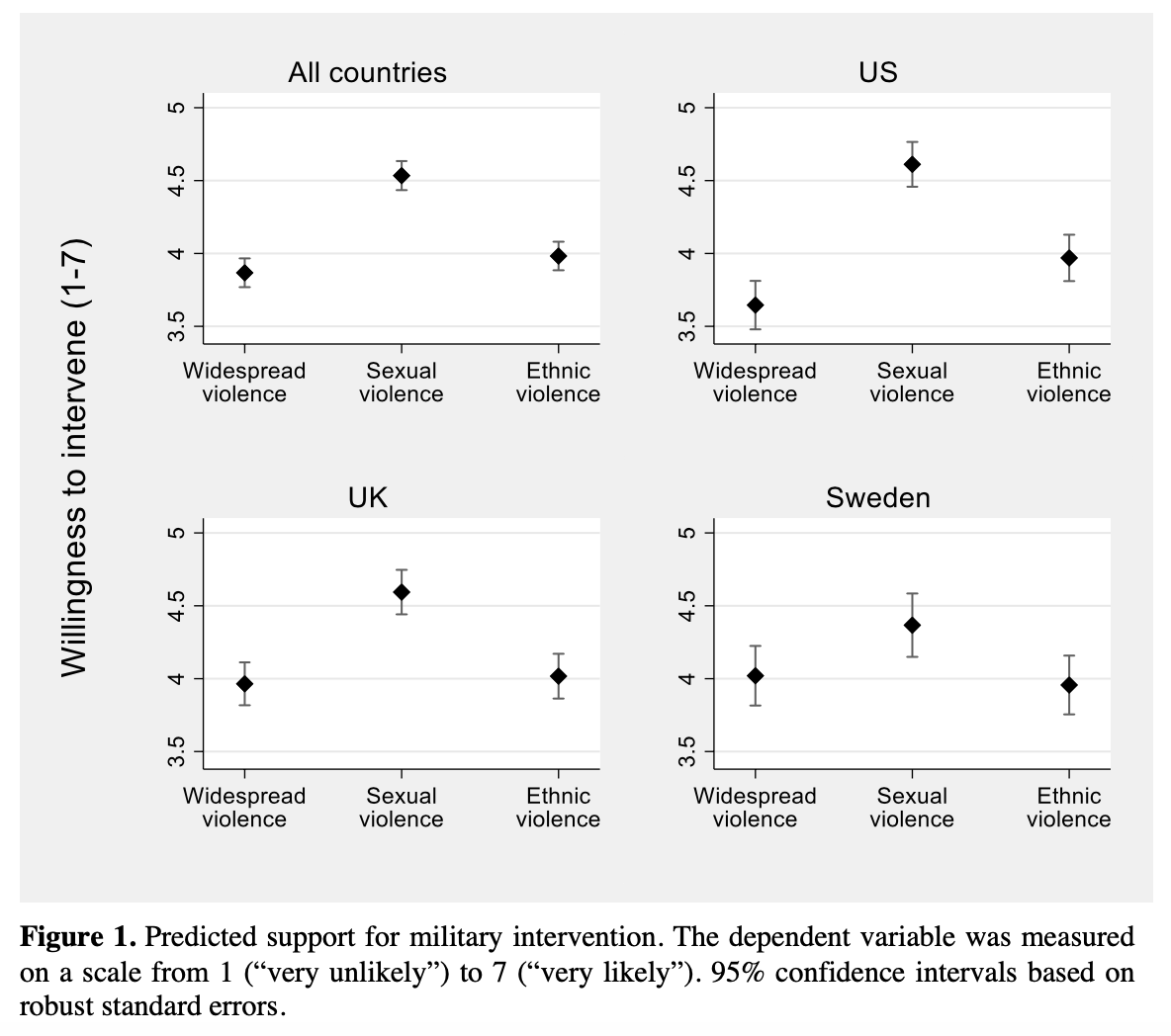Important reminder that civilian men in armed conflicts are much more likely to be victims of killings than women. And yet, aided by framings of humanitarian crises and protection imperatives in highly gendered terms, women continue to be viewed as the ultimate victims  https://abs.twimg.com/emoji/v2/... draggable="false" alt="👇🏼" title="Down pointing backhand index (medium light skin tone)" aria-label="Emoji: Down pointing backhand index (medium light skin tone)"> https://twitter.com/zepecaos/status/1253833797667348480">https://twitter.com/zepecaos/...
https://abs.twimg.com/emoji/v2/... draggable="false" alt="👇🏼" title="Down pointing backhand index (medium light skin tone)" aria-label="Emoji: Down pointing backhand index (medium light skin tone)"> https://twitter.com/zepecaos/status/1253833797667348480">https://twitter.com/zepecaos/...
There is evidence, qualitative as well as quantitative, that women (and girls) are much more likely to be victims of sexual violence in conflict than men, as e.g. the distribution of victims recorded in the Registro Único de Víctimas in Colombia indicates
(Of course underreporting is a major problem when it comes to reports of sexual violence, whether in war or elsewhere. And as sexual violence continues to be seen as violence that is "reserved for women" and that feminizes men, underreporting among male victims is likely higher)
Anyway, my co-author Mattias Agerberg and I have a paper (under review) based on survey experiments in  https://abs.twimg.com/emoji/v2/... draggable="false" alt="🇺🇸" title="Flag of United States" aria-label="Emoji: Flag of United States">
https://abs.twimg.com/emoji/v2/... draggable="false" alt="🇺🇸" title="Flag of United States" aria-label="Emoji: Flag of United States"> https://abs.twimg.com/emoji/v2/... draggable="false" alt="🇬🇧" title="Flag of United Kingdom" aria-label="Emoji: Flag of United Kingdom">
https://abs.twimg.com/emoji/v2/... draggable="false" alt="🇬🇧" title="Flag of United Kingdom" aria-label="Emoji: Flag of United Kingdom"> https://abs.twimg.com/emoji/v2/... draggable="false" alt="🇸🇪" title="Flag of Sweden" aria-label="Emoji: Flag of Sweden"> in which we find inter alia that people think women are more likely to be victims of violence in war than men, and not only if there is widespread sexual violence
https://abs.twimg.com/emoji/v2/... draggable="false" alt="🇸🇪" title="Flag of Sweden" aria-label="Emoji: Flag of Sweden"> in which we find inter alia that people think women are more likely to be victims of violence in war than men, and not only if there is widespread sexual violence
We measured likelihood of being a victim of violence on a 7-point Likert scale. The figure shows the values for men subtracted from the values for women. A score >0 thus means people are more likely to see women as victims than men.
So, people hold empirically inaccurate perceptions of the gendered nature of armed conflict in terms of victimization patterns, which obscures men& #39;s victimization (and also women& #39;s amply documented agency in the form of civil society activism)
This obviously has a bearing on who is deemed worthy of protection: civilians tend to be strategically framed in essentialized terms, as "women and children." On this issue, see this very interesting article by C. Carpenter: https://academic.oup.com/isq/article-abstract/49/2/295/1797233">https://academic.oup.com/isq/artic...
Thus, we find that in conflicts in which women are viewed as particularly likely to be victims - i.e. where armed actors perpetrate a lot of sexual violence - people are more likely to support international intervention than in conflicts with widespread (ethnic) violence
A supplemental mediation analysis based on additional "mechanism" questions we asked in the surveys, suggests that in the U.S. and the UK (albeit not in Sweden), an imperative to protect civilians operates most strongly in the sexual violence scenario
To conclude: perceptions of victimization in armed conflict are gendered & do not always match reality very well, which has important normative implications for how people think about protection of civilians from harm.
I just meant to write a tweet, but somehow I got carried away...

 Read on Twitter
Read on Twitter
 https://abs.twimg.com/emoji/v2/... draggable="false" alt="🇬🇧" title="Flag of United Kingdom" aria-label="Emoji: Flag of United Kingdom">https://abs.twimg.com/emoji/v2/... draggable="false" alt="🇸🇪" title="Flag of Sweden" aria-label="Emoji: Flag of Sweden"> in which we find inter alia that people think women are more likely to be victims of violence in war than men, and not only if there is widespread sexual violence" title="Anyway, my co-author Mattias Agerberg and I have a paper (under review) based on survey experiments in https://abs.twimg.com/emoji/v2/... draggable="false" alt="🇺🇸" title="Flag of United States" aria-label="Emoji: Flag of United States">https://abs.twimg.com/emoji/v2/... draggable="false" alt="🇬🇧" title="Flag of United Kingdom" aria-label="Emoji: Flag of United Kingdom">https://abs.twimg.com/emoji/v2/... draggable="false" alt="🇸🇪" title="Flag of Sweden" aria-label="Emoji: Flag of Sweden"> in which we find inter alia that people think women are more likely to be victims of violence in war than men, and not only if there is widespread sexual violence" class="img-responsive" style="max-width:100%;"/>
https://abs.twimg.com/emoji/v2/... draggable="false" alt="🇬🇧" title="Flag of United Kingdom" aria-label="Emoji: Flag of United Kingdom">https://abs.twimg.com/emoji/v2/... draggable="false" alt="🇸🇪" title="Flag of Sweden" aria-label="Emoji: Flag of Sweden"> in which we find inter alia that people think women are more likely to be victims of violence in war than men, and not only if there is widespread sexual violence" title="Anyway, my co-author Mattias Agerberg and I have a paper (under review) based on survey experiments in https://abs.twimg.com/emoji/v2/... draggable="false" alt="🇺🇸" title="Flag of United States" aria-label="Emoji: Flag of United States">https://abs.twimg.com/emoji/v2/... draggable="false" alt="🇬🇧" title="Flag of United Kingdom" aria-label="Emoji: Flag of United Kingdom">https://abs.twimg.com/emoji/v2/... draggable="false" alt="🇸🇪" title="Flag of Sweden" aria-label="Emoji: Flag of Sweden"> in which we find inter alia that people think women are more likely to be victims of violence in war than men, and not only if there is widespread sexual violence" class="img-responsive" style="max-width:100%;"/>




